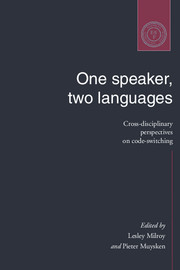Book contents
- Frontmatter
- Contents
- Notes on contributors
- Acknowledgments
- 1 Introduction: code-switching and bilingualism research
- Part one Code-switching in institutional and community settings
- Part two Code-switching and social life
- Part three Grammatical constraints on code-switching
- Part four Code-switching in bilingual development and processing
- 12 A psycholinguistic approach to code-switching: the recognition of guest words by bilinguals
- 13 Code-switching in bilingual first language acquisition
- 14 The code-switching behaviour of adults with language disorders – with special reference to aphasia and dementia
- 15 Conclusion: code-switching research as a theoretical challenge
- Index
15 - Conclusion: code-switching research as a theoretical challenge
Published online by Cambridge University Press: 05 June 2012
- Frontmatter
- Contents
- Notes on contributors
- Acknowledgments
- 1 Introduction: code-switching and bilingualism research
- Part one Code-switching in institutional and community settings
- Part two Code-switching and social life
- Part three Grammatical constraints on code-switching
- Part four Code-switching in bilingual development and processing
- 12 A psycholinguistic approach to code-switching: the recognition of guest words by bilinguals
- 13 Code-switching in bilingual first language acquisition
- 14 The code-switching behaviour of adults with language disorders – with special reference to aphasia and dementia
- 15 Conclusion: code-switching research as a theoretical challenge
- Index
Summary
Introduction
This concluding chapter is designed to suggest how the reader might move towards a synthesis of the wide range of material presented in earlier chapters, to consider some interrelationships and to raise some broader issues. We can begin by assessing the value of the opportunity provided by the European Science Foundation, over a period of three years, of convening three international workshops, a large international colloquium and a school where young researchers could work out their ideas with established scholars, in order to allow researchers in this field to focus intensively on key issues in code-switching research. Chapter 1 comments in a general way on the value of this ESF initiative, but we can now go a little further in view of the results of the work of the ESF Research Network as they appear in this volume. However, it is worth emphasising before we proceed further that these pages are not the only product of several intensive research meetings; scholars from different countries and a range of different research traditions learnt to appreciate approaches other than their own, and established lasting networks of friendship and scholarly collaboration. This is an important achievement in a contemporary world fraught with divisions and conflicts, not all of them academic.
As we saw in chapter 1, the study of bilingualism has historically been associated with practical issues such as educational policies, the development of writing systems and, more generally, with the numerous political and policy issues raised by the existence of bilingual populations.
- Type
- Chapter
- Information
- One Speaker, Two LanguagesCross-Disciplinary Perspectives on Code-Switching, pp. 344 - 355Publisher: Cambridge University PressPrint publication year: 1995
- 2
- Cited by

